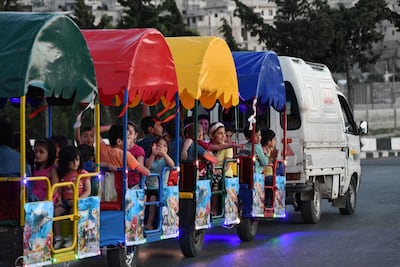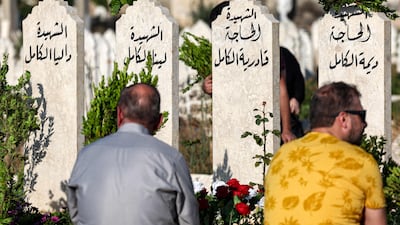Residents of Syria's Idlib clung to ritual in place of gifts, new clothes and food on Wednesday, as the region continues to suffer from the fallout of a devastating earthquake and more than a decade of war.
Abu Muhammad, 40, from the city of Harem in the north of Idlib, took his children to the mosque to perform Eid prayers, then to a local cemetery where his father is buried. His children placed flowers on the grave together.
“This Eid is not like the previous one. The earthquake turned our lives upside down,” he told The National.
“After this year, my family's Eid was limited to Eid prayers and visiting graves. These two rituals are preserved by all segments of society, rich and poor, the displaced and the resident.”
The 7.8-magnitude earthquake that hit Syria and Turkey in February killed more than 50,000 people and injured 100,000. Idlib in particular has struggled to recover, as aid to the rebel-held enclave has been slow to come through.
“I survived the earthquake, thank God, but I lost everything I owned now. I live in a rented house, and I was unable to prepare sweets or buy new clothes for the children,” says Abu Muhammad.
His neighbour, Mahmoud Al Ahmad, is suffering under similar strain. He lost his home in the earthquake, but survived with his family.
“Last year, we were from the middle-income class, and I was able to slaughter a sacrifice and buy new clothes for my children,” he says. “But this holiday, there is no reason for joy.
“My children were deprived of new clothes and Eid gifts … they hardly have food. We have lost everything”.
Sacrifices are the most obvious absence for Syrians this Eid.

The price of sheep has more than doubled. Sacrifices are now limited to the wealthy and some humanitarian organisations that are active in the region.
Muhannad Al Shammat used to make a sacrifice every year and distribute the meat to his neighbours.
“I was not able to buy the sacrifice for this year, because the prices are high, but I bought new clothes for the children and made sweets for them,” he says. “The joy of Eid is in the joy of my children.”
Some children have been lucky enough to secure Eidiyat, a small sum of cash to celebrate Eid Al Adha, this year.
The amounts provided to children range between 25 Turkish liras and may reach up to 100 liras – or about $1 to $3.80 – according to the budget of each family.
Omar Razzouk, 10, was given 125 Turkish liras by his father and uncles.
“This is enough money to go to the amusement park, play with swings and games,” he says excitedly.
Ahmed Maatouq, eight, has seen his Eidyah dwindle, but is happy to have received it nonetheless.
“Last year, the value of the gifts that I collected was 200 liras, but this holiday I only collected less than half of this amount,” he says.
But the decrease in disposable income and displacement caused by the colossal earthquake, which destroyed hundreds of thousands of homes, mean that many communities' annual rituals are falling by the wayside.
In the Jenderes neighbourhood, women would traditionally gather together to make Eid sweets before the big day. Now, the smell of cooking sugar and the sound of traditional song is noticeably absent from the alleyways.
“I had to sell my wedding ring, which is the only memory I keep after the death of my husband, in order to make my orphan grandchildren happy after their father died in the earthquake disaster,” Nazik Tammo, 50, says.
“I bought them new clothes and made a small amount of sweets for them in my house.”

